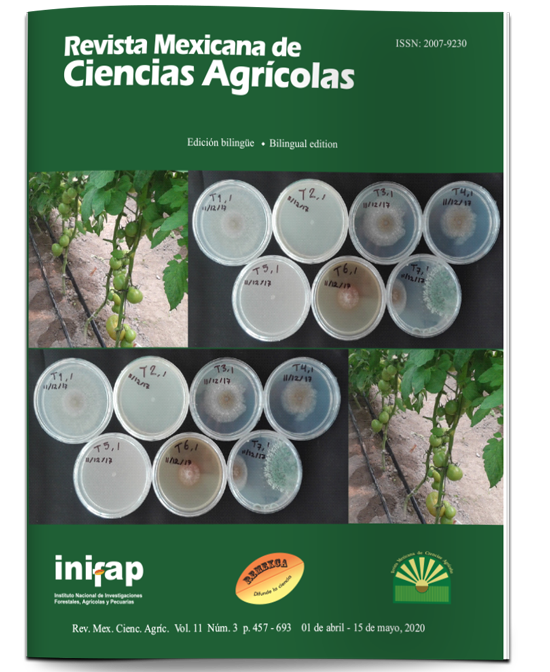Effect of chitosan on variables of tomato growth, yield and nutritional content
DOI:
https://doi.org/10.29312/remexca.v11i3.2392Keywords:
bioproduct, biostimulant, quality, vegetableAbstract
Chitosan is a compound of natural origin with properties that promote nutrition, growth and yield of crops, which is why it has been considered as a biostimulant. Its particular mechanisms of action allow it to act as a growth regulator, accelerator of seed germination, plant vigor and agricultural performance. The present work was developed under semi-controlled conditions on a completely randomized design, with the aim of evaluating the effect of different concentrations of chitosan (150, 200, 250 and 300 mg L-1) on growth, yield, fruit quality and content of nutrients in tomato plants variety Floradade. The results show that the bioproduct exerts a stimulating effect on the variables: height of the plant, clusters with fruits, fruits per plant, equatorial and polar diameter of the fruit, diameter of the pericarp and fruit mass. The concentration of 300 mg L-1 significantly increased the values in all the variables evaluated with respect to the control treatment. However, in the indicators of fruit quality, there was a slight tendency to improve the acidity variable with the application of the biostimulant and the rest of the evaluated organoleptic and nutritional variables did not undergo notable alterations even when the highest doses of chitosan were used.
Downloads
Published
How to Cite
Issue
Section
License
The authors who publish in Revista Mexicana de Ciencias Agrícolas accept the following conditions:
In accordance with copyright laws, Revista Mexicana de Ciencias Agrícolas recognizes and respects the authors’ moral right and ownership of property rights which will be transferred to the journal for dissemination in open access. Invariably, all the authors have to sign a letter of transfer of property rights and of originality of the article to Instituto Nacional de Investigaciones Forestales, Agrícolas y Pecuarias (INIFAP) [National Institute of Forestry, Agricultural and Livestock Research]. The author(s) must pay a fee for the reception of articles before proceeding to editorial review.
All the texts published by Revista Mexicana de Ciencias Agrícolas —with no exception— are distributed under a Creative Commons License Attribution-NonCommercial 4.0 International (CC BY-NC 4.0), which allows third parties to use the publication as long as the work’s authorship and its first publication in this journal are mentioned.
The author(s) can enter into independent and additional contractual agreements for the nonexclusive distribution of the version of the article published in Revista Mexicana de Ciencias Agrícolas (for example include it into an institutional repository or publish it in a book) as long as it is clearly and explicitly indicated that the work was published for the first time in Revista Mexicana de Ciencias Agrícolas.
For all the above, the authors shall send the Letter-transfer of Property Rights for the first publication duly filled in and signed by the author(s). This form must be sent as a PDF file to: revista_atm@yahoo.com.mx; cienciasagricola@inifap.gob.mx; remexca2017@gmail.
This work is licensed under a Creative Commons Attribution-Noncommercial 4.0 International license.



